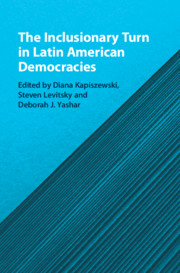Book contents
- The Inclusionary Turn in Latin American Democracies
- The Inclusionary Turn in Latin American Democracies
- Copyright page
- Contents
- Figures
- Tables
- Contributors
- Acknowledgments
- Prologue: Reflections on Two Episodes of Popular Inclusion
- 1 Inequality, Democracy, and the Inclusionary Turn in Latin America
- Part I Extending Social Policy and Participation
- Part II Inclusion and Partisan Representation
- 6 Changing Patterns of Ideology and Partisanship in Latin America
- 7 Brokering Inclusion
- 8 States of Discontent
- Part III New Party–Society Linkages
- Part IV Inclusion, Populism, and Democracy
- References
7 - Brokering Inclusion
Intermediaries, Clientelism, and Constraints on Latin America’s Left Turn
from Part II - Inclusion and Partisan Representation
Published online by Cambridge University Press: 12 January 2021
- The Inclusionary Turn in Latin American Democracies
- The Inclusionary Turn in Latin American Democracies
- Copyright page
- Contents
- Figures
- Tables
- Contributors
- Acknowledgments
- Prologue: Reflections on Two Episodes of Popular Inclusion
- 1 Inequality, Democracy, and the Inclusionary Turn in Latin America
- Part I Extending Social Policy and Participation
- Part II Inclusion and Partisan Representation
- 6 Changing Patterns of Ideology and Partisanship in Latin America
- 7 Brokering Inclusion
- 8 States of Discontent
- Part III New Party–Society Linkages
- Part IV Inclusion, Populism, and Democracy
- References
Summary
The growth of economic informality, the transformation of left party-union linkages, and the rise of political decentralization in Latin America have all empowered local “brokers" who are linked to national political parties but also substantially autonomous and often opportunistic. The leaders of left parties in the region – even parties that are externally mobilized or that advance programmatic platforms promoting greater inclusion of popular sectors – have often needed to negotiate with such actors to secure power and implement policies. In this chapter, we consider the resources that intermediaries offer to parties but also the challenges that broker-mediated incorporation poses for left parties. We then use new evidence from Brazil – n particular, from the experience of the externally mobilized, programmatic Workers’ Party (PT) – to show the necessity but also the fragility of alliances with such actors. We assess possible implications of the reliance on brokers for the sustainability of the “inclusionary turn" in Latin America.
- Type
- Chapter
- Information
- The Inclusionary Turn in Latin American Democracies , pp. 219 - 253Publisher: Cambridge University PressPrint publication year: 2021

